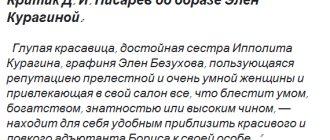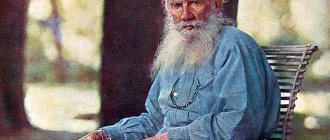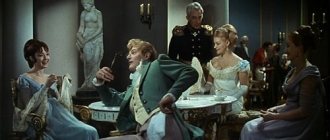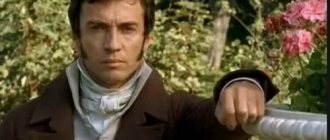If it weren’t for God’s will, they wouldn’t give up Moscow... M.Yu. Lermontov
Having studied Leo Tolstoy’s epic novel “War and Peace,” many historians argue that Tolstoy allowed himself to distort some facts of the Patriotic War of 1812. This applies to the Battle of Austerlitz and the Battle of Borodino. Indeed, the Battle of Borodino in Tolstoy’s novel “War and Peace” is described in sufficient detail, which makes it possible to study historical events through the pages of the novel. However, the opinion of historians agrees that the main battle of the entire Patriotic War of 1812 was Borodino. It was this that was the reason for the Russian victory over the French army. It was this that became decisive.
Rebirth of Count Bezukhov on the field
When war begins, every person, regardless of age and gender, is overcome by anxious thoughts. Pierre used to be lonely, withdrawn, and was in constant search for the meaning of life. As soon as Napoleon's army approached the gates of Moscow, Count Bezukhov felt that even life was nonsense, comparing it with the impending disaster.
The importance of everyday amenities, wealth and vanity becomes insignificant for a decent citizen if the threat of enslavement hangs over his people. Every honest person rushed to where the fate of his country was being decided - to Borodino.
Here is the author’s literary secret - through the eyes of Bolkonsky or Rostov, who read the picture of August 25, 1812, like habitual maneuvers, everything looked quite ordinary. From the point of view of the inexperienced layman, the sea of people flocking to the gathering place testified to the patriotic greatness of the upcoming battle.
V. The Battle of Borodino through the eyes of Pierre
The picture of the Borodino battle in the novel is given through the perception of a civilian, Pierre Bezukhov. He understands little about strategy and tactics, but he perceives everything that happens with the heart and soul of a patriot. Pierre himself could not explain why he went to the Borodino field. He only knew that it was impossible to stay in Moscow. He wanted to see with his own eyes that incomprehensible and majestic thing that was about to happen in his fate and the fate of Russia. It is not curiosity alone that drives Pierre to Borodino; he wants to be among the people, where the fate of Russia is being decided. And Pierre is not just an idle contemplator of what is happening, he tries to be useful, rushes about, ends up not where he would like, but where “destined by fate.” Pierre, by the will of fate, ended up on the “Raevsky battery,” decisive events took place here, as historians would later write, but even without them, Bezukhov “seemed that this place (precisely because he was on it) was one of the most significant places of the battle. The half-blind eyes of a civilian cannot see the full scale of events, but only locally, what is happening around. And here, as if in a drop of water, all the drama of the battle, its incredible intensity, rhythm, and tension from what was happening was reflected. The battery changed hands several times. Pierre fails to remain a contemplative; he actively participates in protecting the battery, but does everything on a whim, out of a sense of self-preservation. Bezukhov is scared of what is happening, he naively thinks that “... now they (the French) will leave it, now they will be horrified by what they did!
VI. Pierre in Moscow. The idea to kill Napoleon.
With such thoughts
Bezukhov returns
to Moscow
.
At the time when the French almost reached the quarter in which Pierre
, he was “in a state close to madness.”
Pierre
had long been occupied with
the thought
of the predetermination of his fate, of his highest destiny
to kill Napoleon
; “a feeling of the need for sacrifice and suffering” lived in him.
VII. Captivity. Meeting with Platon Karataev. The influence of Platon Karataev on Pierre's worldview
Platon Karataev
- a simple Russian soldier who was captured
,
wise, patient, calm, humble, he managed to play a very important and valuable role in
Pierre’s
.
The meeting with Plato
helped
Pierre
find himself, find his purpose, this
meeting
helped him see his whole life from the inside, without a passage, balls,
meetings
.
VIII. Love for Natasha. The birth of a new Bezukhov family.
Pierre's marriage to Helen turned into bitter disappointment, despondency, contempt for his wife, for life, for himself. Having met Natasha, Pierre, like Andrei, was amazed and attracted by her purity and naturalness. Feelings for her had already timidly begun to grow in his soul when Bolkonsky and Natasha fell in love with each other. Unlike Andrei, Pierre's kind heart understood and forgave Natasha after the incident with Anatole Kuragin. Although he tried to despise her, he saw the exhausted, suffering Natasha, and “a never-before-experienced feeling of pity filled Pierre’s soul.” The meeting with Pierre Bezukhov after his return from captivity, his attention and love finally healed Natasha. In the epilogue of the novel, she is Pierre's wife, the mother of four children. She has lost her girlish charm. “Everyone who knew Natasha before her marriage was surprised at the change that had taken place in her, as if it were something extraordinary... One mother was surprised at the surprise of people who did not understand Natasha, and repeated that she always knew that Natasha would be an exemplary wife and mother...” Natasha’s nature is not has changed. Love still constituted the meaning of life for her; she devotes herself entirely to the interests of her family.
IX. Pierre's passion for radical ideas of changing the social order
The reader sees how Pierre's character changes throughout the novel and his worldview is formed. With his mature character, Pierre Bezukhov is close to the Decembrists. But this man’s path on the pages of the novel is rich in discoveries he made in life, as well as disappointments. At the very beginning of the novel “War and Peace” we see a plump, one might even say fat, young man of tall stature. Intelligence is visible in Pierre's gaze. This look is very observant, but at the same time very timid. Pierre is an emotional person, malleable and soft. It is not difficult for anyone to influence this person. The main distinguishing features of Pierre Bezukhov from those around him are his simplicity, sincerity and naturalness. Pierre is impressed by the ideas of the French Revolution. He likes the image of Napoleon. Pierre wants to “create a republic in Russia, then be Napoleon himself...”. The gullibility and naivety of Pierre Bezukhov lead to what he did in his young, not yet mature life. a lot of mistakes. For example, his marriage to Helen Kuragina. By marrying a very beautiful woman, he does not receive family happiness. Having divorced his wife and given her most of his fortune, Pierre embarks on another search for answers to many of his questions: “What’s wrong? What well? What should you love, what should you hate? Why live, and what am I...” For a certain period of time, Pierre seems to have found meaning in life: he becomes interested in Freemasonry and his idea becomes “to regenerate the vicious human race.” Pierre is captivated by the ideas of “equality, brotherhood and love.” Pierre tries to find practical applications of these ideals. For example, Bezukhov tries to make the life of serfs easier. He wants to build hospitals, schools and orphanages. “And only now, when I... try... to live for others, only now I understand all the happiness of life,” says Pierre. But the ideas of Pierre Bezukhov were not shared by most people, even among the Freemasons. And gradually the hero of the novel becomes disillusioned with Freemasonry, since in the ranks of this society he is faced with manifestations of careerism, hypocrisy and hypocrisy. And again, Pierre faces a lot of questions: “Why? For what? What is going on in the world?” Pierre takes some part in the Patriotic War of 1812. He was not a military man. But with his own money he formed a regiment that fights the French. Pierre himself remains in Moscow, and his goal is the murder of Napoleon, since Bezukhov considers Napoleon to be the culprit of the people's misfortunes. The war destroys Pierre Bezukhov's faith in justice. After all, he sees it. what's going on around. An ordinary soldier, Platon Karataev, makes Pierre believe in goodness and justice again. After communicating with Karataev, Pierre found “that calmness and self-satisfaction for which he had vainly strived before,” “...he learned not with his mind, but with his whole being, that man was created for happiness, that happiness is in himself, in the satisfaction of natural human needs ..." Pierre Bezukhov looked for the meaning of life in everything: “He looked for this in philanthropy, in Freemasonry, in the distraction of social life, in wine, in the heroic feat of self-sacrifice, in romantic love for Natasha. He sought this through thought, and all these searches and attempts deceived him.” At the end of the novel, the reader sees a happy Pierre Bezukhov, surrounded by the warmth and love of a wonderful family. The hero of Leo Nikolaevich Tolstoy’s “War and Peace” found spiritual harmony with himself, as well as with the world around him.
Morning of August 26, 1812
Count Bezukhov was greeted after sleep by the bright sun, which has always been a symbol of life for people, a guarantee of fertility. Only now the rays were reflected like bunnies from the steel of the soldiers’ bayonets, which were beginning to emerge through the thick dawn fog. The ringing of weapons called to the hero, Pierre was drawn into the thick of noisy events. There the truth of the confrontation between good and evil should have been revealed. The count still liked the first salvo of the gun; the smoke looked like a white fluffy ball. Everything around looked like an interesting adventure; Bezukhov asked to go deep into the battle with one general and found himself on the first line of fire.
The master looked ridiculous among the guns: dressed in civilian dress, with a white hat on his head, he was uncertainly riding a horse. It was unpleasant for the soldiers to see here, among their bloody work, among the wounded and killed, a peaceful, absent-minded gentleman.
Baptism by fire
The instinct of self-preservation forces Pierre to rush to the aid of the artillerymen. Raevsky's battery passed from the hands of Russian soldiers to the French and back several times a day. Historians confirm that these were moments that decided the outcome of the battle. The master agrees to bring cannonballs to the soldiers.
Pierre heard thunder, crackling and whistling simultaneously when boxes of ammunition exploded nearby. The glare of the huge flame blinded him and forced him to sit down on the ground. Fear consumes a person at the moment of danger, so without realizing his actions, the count ran to where he could hide. To the trenches. But there the enemies are already killing his compatriots.
Bezukhov automatically grabs the French soldier by the throat. Before him is the alien face of a man who has never done anything bad to him before. Pierre is not yet ready to kill, but for the first time he has to defend his life.
Finally, the attack is over, the hero can take a breath, contemplating how the wounded and killed of both armies mix in this temporary respite. The war has lost its primary pathos, the man feels horror, but naively thinks that now these people will wake up and stop killing each other.
The Battle of Borodino in Tolstoy's assessment
Tolstoy does not hide his misunderstanding of the senselessness of the actions of the Russian army and gives his assessment of the Battle of Borodino in “War and Peace”: “The Battle of Borodino did not take place in a chosen and fortified position with somewhat weaker Russian forces at that time, but the Battle of Borodino, due to the loss of the Shevardinsky redoubt, was adopted by the Russians in an open, almost unfortified area with forces twice as weak against the French, that is, in such conditions in which it was not only unthinkable to fight for ten hours and make the battle indecisive, but it was unthinkable to keep the army from complete defeat for three hours and escape."
Borodino field in the evening
Pierre Bezukhov realized the catastrophic consequences of what happened at a time when everyone who survived realized the catastrophe. The fields, meadows and vegetable gardens of several villages were littered with bodies of people. Different uniforms were colorful, the dead were frozen in different poses, only everyone’s blood was dark red.
Dressing stations hundreds of meters around were saturated with blood, which mixed with the ground and turned into thick bloody mud. A stream of wounded soldiers, frightened and suffering from pain, wandered in the direction of Mozhaisk.
The morning cheerfulness was replaced by a damp haze, sharply smelling of smoke, a mixture of saltpeter and blood. Nature tried to force people to stop shooting and stabbing each other with bayonets - it started to rain. The exhausted soldiers could not withstand the psychological pressure, the sight of thousands of dead, wounded, maimed and exhausted, but they fought by inertia.
It is probably impossible to stop the terrible business of war instantly.
The Battle of Borodino through the eyes of Andrei Bolkonsky
Prince Bolkonsky's regiment entered the battle in the middle of the day. Two hundred soldiers fell under the cannonballs while still standing and inactive. Then, under the fire of several hundred enemy guns, a third of the entire regiment was killed. People were lined up in columns, forced to stand under enemy fire. Here and there a shot hit the crowd of non-attacking soldiers.
The episode of Andrei Tolstoy’s wounding presented how tens of thousands of soldiers and officers died that day. The patriot who raised the banner at Austerlitz and commanded a battery at Schöngraben died senselessly. War often does not provide the opportunity to show heroism; it takes lives for no reason.
The enemy cannonball overtook the combat officer as he walked aimlessly across the field, listening to the noise of shells flying overhead. There was a moment when Bolkonsky could have avoided being hit. The adjutant managed to fall to the ground and shout “get down,” but the officer remembered that his subordinates were looking at him, whose morale depended on his behavior.
Among the Russian people there are always people who do not run, are not silent, and do not hide. As a rule, they die, but remain in the memory of those around them as heroes worthy of fond memory.
Death of Andrei Bolkonsky
A large number of officers who took part in the battle died, some were captured or mortally wounded. This happened with Prince Andrei Bolkonsky: the wound turned out to be incompatible with life. Before the start of the battle, he is in an uncharacteristic state, which surprises him. Bolkonsky feels a strange anxiety that was unusual for him. All the important moments in his life flash before his eyes, but he is still confident that the Russian army will win the battle, which he shares with Pierre.
The prince sees how the soldiers are preparing to die, realizing their position. Men who are in the militia wear clean white shirts. For him, the battle became the last stage of his spiritual quest. Dying in the arms of his beloved Natasha Rostova, he thinks about the warm earth and grass. The chapter in which Andrei Bolkonsky was wounded cannot leave readers indifferent, because his death was absolutely meaningless .
He did not run forward, carrying a banner, as at Austerlitz, and was not on the battery, as at Shengraben, but only walked across the field, counting his own steps, and listened to the noise of shells, where one of them overtook him. The adjutant who was nearby at that moment fell to the ground, shouting to Bolkonsky: “Get down!”, but he stood and thought that this was not how he wanted to die, and at the same time he was concerned about the many eyes looking at him. The prince could not have acted differently. To lie down meant to trample on your dignity and valor. Andrei Bolkonsky died defending the ideals that his father instilled in him.
Leo Tolstoy's attitude to the Battle of Borodino
Leo Tolstoy is a famous humanist in the world of classical literature, he tried to convey his disgust for war to future generations. The author personally spent a lot of time at the site of the Borodino battle in order to reflect every detail of the topography in the novel. To imagine the scale of the tragedy that unfolded on August 26, 1812.
According to the writer, neither Napoleon nor Kutuzov had such powerful power that was capable of preventing the death of both armies or stopping the battle in the middle of the day. Two aggressive forces converged on the Borodino field to turn the course of history in a different direction.
The kind and wise Leo Tolstoy put his seven years of work into creating a novel in order to convey to the world a simple truth - the bloodshed of nations always remains the dirtiest thing in the literal and figurative sense. Wounds and pain equally bring suffering to people of all nationalities, regardless of faith and social status.
Progress of the Battle of Borodino
All Russian people know this historical moment. In schools they write an essay on the topic of the Battle of Borodino, studying in detail the details of the battle. The Russian army was led by General Mikhail Kutuzov, while the French were led by Emperor Napoleon Bonaparte. The Battle of Borodino in the novel “War and Peace” is the most brutal of all those described in the book.
There is still debate about whose victory. It is believed that Kutuzov won the battle, but the French give laurels to Napoleon because the Russian troops decided to retreat after 12 hours of confrontation. L. N. Tolstoy’s book “War and Peace” tells not only the course of the battle, but also subsequent events.
Kutuzov's main tactics were to retreat. The commander-in-chief believed that in this way the enemy, actively moving deeper into Russia, would exhaust its strength. In addition, he hoped for the help of reinforcements, so necessary for the final victory over the French.
In the battle of Borodino, more than 40 Russian generals died, Bagration was mortally wounded. Andrei Bolkonsky could not avoid this either. In his memoirs, Napoleon wrote that the Moscow battle was the largest in his life . He also admitted that it was here that he gained great military experience.
A detailed description of the confrontation in Tolstoy’s novel allows readers to visit the French headquarters, move to the Russians in Raevsky’s battery, or see the regiment where Bolkonsky served.
The battle itself is considered the climax of the novel and describes many historical events.






